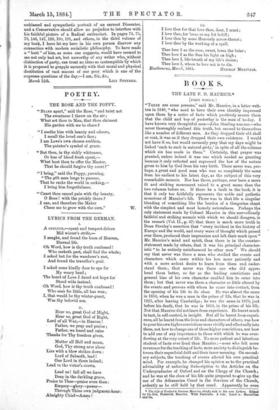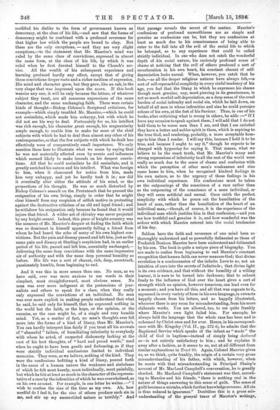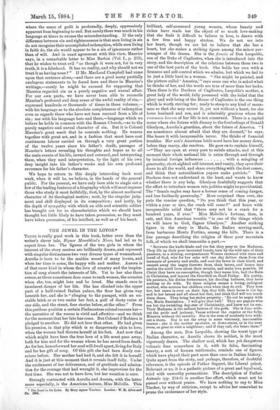BOOKS.
THE LATE F. D. MAURICE.*
[FIRST NOTICE.1 "Tian are some persons," said Mr. Maurice, in a letter writ- ten in 1849, "who need to have their own identity impressed upon them by a series of facts which positively assure them that the child and boy of yesterday is the man of to-day. I have known very thoughtful men—John Sterling was one—who never thoroughly realised this truth, but seemed to themselves like a number of different men. As they dropped their old shell or coat, it was as if they dropped their own existence. I would not have it so, but would earnestly pray that my days might be linked each to each in natural piety,' in spite of all the schisms which sin has made in them." Certainly, that prayer was granted, unless indeed it was one which needed no granting because it only reflected and expressed the law of the nature given to hint by God from his very birth. There never was, per- haps, a great and good man who was so completely the same from his earliest to his latest day, as the subject of this very remarkable memoir. Nor has there, perhaps, ever been a more fit and striking monument raised to a. great name than the two volumes before us. If there be a fault in the book, it is that it only too faithfully represents the noble and pathetic monotone of Manrice's life. There was in that life a singular blending of something like the burden of a Gregorian chant with the simplest and most homely naturalness. Perhaps the only statement made by Colonel Maurice in this marvelously faithful and striking memoir with which we should disagree, is the remark (Vol. II., j. 67) that there is much more truth in Dean Stanley's assertion that "every incident in the history of Europe and the world, and every wave of thought which passed over them, produced their impression and left their mark upon" Mr. lianrice's mind and spirit, than there is in the counter- statement made by others, that it was his principal character- istic " to be entirely uninfluenced by other men." We should say that never was there a man who studied the events and characters which came within his ken more patiently and with a more ardent desire to learn from them and under- stand them ; that never was there one who did appre- hend them better, so far as the leading convictions and general bias of his own character enabled him to enter into them ; but that never was there a character so little altered by the events and persons with whom he came into contact, from the opening of his life to its close. He was almost the same in 1850, when he was a man in the prime of life, that he was in 1825, after leaving Cambridge; he was the same in 1870, just before his death, that he was in 1850, in the prime of his life. Not that Maurice did not learn from experience. He learnt much intact, in self-control, in insight. But all ho learnt from experi- ence, all he learnt from the lives and characters of others, was how to pour his own higherconvictions more vividly and effectually into them, not how to change one of those higher convictions, nor how to add one of any importance to those with which he was over- flowing at the very outset of life. No more patient and laborious student of facts ever lived than Maurice ;—none who felt more reverence for the teaching of facts, more anxiety to distinguish be- tween their superficial drift and their inner meaning. On second- ary subjects, the teaching of events altered his own practical mind. For example, he changed his opinion as to the practical advisability of enforcing Subscription to the Articles on the Undergraduates of Oxford and on the Clergy of the Church; and he was at the close of his life quite prepared to'give up the use of the Athanasian Creed in the Services of the Church, ardently as he still held by that creed. Apparently he even • The Life o Frederick Denison Maurice. chiefly told in his own. Letters Edited by hie Son, Maurice. With Portrait!. 2 via. Loud : Macmilltot
and Ow
modified his dislike to the form of government known as democracy, at the close of his life,—and saw that the forms of democracy might be combined with a profound reverence for that higher law which the people are bound to obey. But these are the only exceptions, — and they are very slight exceptions,—to the statement that Mr. Maurice's mind was ruled by the same class of convictions, expressed in almost the same form, at the close of his life, by which it was ruled when he first devoted himself to the Church's ser- vice. All the wealth of his subsequent experience and learning produced hardly any effect, except that of giving those convictions deeper roots and a richer medium of expression. His mind and character grew, but they grew, like an oak, in the very shape that was impressed upon the acorn. If this book wearies any one, it will be only because the letters, of whatever subject they treat, are all sonorous expressions of the same character, and the same unchanging faith. There were certain kinds of thought—Bishop Colenso's Scriptural criticisms, for example—which simply troubled Mr. Maurice,—which he could not assimilate, which made him unhappy, but with which be did not see his way to deal. Fortunately for us, his intellect was rich enough, his character great enough, his magnanimity ample enough, to enable him to make far more of the chief subjects with which he had to deal than almost any other of his contemporaries, so that the few subjects with which he dealt less effectively were of comparatively small importance. We only mention them here to illustrate what we mean by saying that he was not materially affected even by events and influences which seemed likely to make inroads on his deepest convic- tions. All that he could assimilate he did assimilate, and it greatly enriched his nature and his intellect. What was foreign to him, when it clamoured for notice from him, made him very unhappy, and yet he hardly took it in ; nor did it eventually alter either the attitude of his mind, or the proportions of his thought. He was so much disturbed by Bishop Colenso's assault on the Pentateuch that he pressed the resignation of his own living, simply in order that he might clear himself from any suspicion of selfish motive in protesting against the destructive criticism of an old and loyal friend ; and he withdrew his resignation only because he found that it would injure that friend. A wilder act of chivalry was never projected by any knight-errant. Indeed, this piece of knight-errantry was the measure of Mr. Maurice's despair at finding the faith which was so dominant in himself apparently failing a friend from whom he had heard the echo of many of his own highest con- victions. But the pain and dismay passed and left him, just as the same pain and dismay at Sterling's .scepticism had, in an earlier period of his life, passed and left him, essentially unchanged,— delivering the same deep convictions with the same impressive air of authority and with the- same deep personal humility as before. His life was a sort of channt, rich, deep, awestruck, passionately humble, from beginning to end.
And it was this in more senses than one. No man, as we have said, ever was more anxious to use words in their simplest, most straightforward, most obvious sense. No man was ever more indignant at the pretensions of jour- nalists and others to speak for a class, when they really only expressed the convictions of an individual. No man was ever more explicit in making people understand that what he said, he said only for himself, that he expressed nothing in the world but the faith, or the hope, or the opinion, or the surmise, as the case might be, of a single and very humble mind. Yet, as a matter of fact, no man's thoughts ever fell
more can the forms of a kind of litany, than Mr. Maurice's. You can hardly interpret him fairly if you treat all his avowals of "shameful " failure, of humiliating inferiority to everybody with whom he acted, of suspected dishonesty lurking at the root of his best thoughts, of "hard and proud words," used when he ought to have been gentle and forbearing, as if they were strictly individual confessions limited to individual memories. They were, as we believe, nothing of the kind. They were the -confessions befitting a -kind of litany, poured forth in the name of a human nature the weakness and sinfulness of which he felt most keenly, most individually, most painfully, but which he felt at least as much in the character of the represen- tative of a race by the infirmities of which he was overwhelmed, as on his own account. For example, in one letter he writes :—" I wish to confess the sins of the time as my own. Ah, how needful do I feel it, for the sins of others produce such sin in me, and stir up my unsanctified nature so 'terribly." And that passage reveals the secret of the matter. Maurice's- confessions of profound unworthiness are as simple an& genuine as confessions can be, but they are confessions at• least as much due to his consciousness of being able to enter to the fall into all the evil of the social life to which he belonged, as to any experience that could be called strictly individual. In one who does not catch the wonderful depth of -his social nature, his curiously profound sense of' shame at noticing that the evil of others produced a sort of reverberation in his own heart, his constant chaunt of self- depreciation looks unreal. When, however, you catch that he- feels,—as all the deeper religious natures have always felt,—a• sort of self-reproachful complicity in every sinful tendency of his age, you feel that the litany in which he expresses his shame though most genuine, nay, most piercing in its genuineness, is not so much morbid self-depreciation, as a deep sense of the erne} burden of social infirmity and social sin, which he laid down, on behalf of all men in whose infirmities and sins he could perceive- echoes of his own, at the feet of his Saviour. Thus, in one of his books, after criticising what is wrong in others, he adds :—" If I have any occasion to speak against them, I will add that I do not hold then to be worse men than I am, and that I am satisfied' they have a better and nobler spirit in them, which is aspiring to the true God, and rendering, probably, a more acceptable hom- age to him than I render. I will say this, because I hold it to'be- true, and because I ought to say it," though he expects to be charged with hypocrisy for saying it. That' means, what we- believe to be the exact truth, that Mr. Maurice's many an& strong expressions of inferiority to all the rest of the world were- really as much due to the sense of shame and confusion with, which the perception of other men's weaknesses and sins- came home to him, when he recognised kindred feelings in, his own nature, as to the urgency of those feelings in his own individual experience. His confessions must be taken as the outpourings of the conscience of a race rather than as the outpouring of the conscience of a mere individual, or- they will seem artificial and unreal. Once catch the perfect simplicity with which he pours out the humiliation of the- heart of man, rather than the humiliation of the heart of an, individual man,—though, of course, it is the experience of the- individual man which justifies him in that confession,—and you. see how truthful and genuine it is, and how wonderful was the- ardour with which Maurice entered into the social. tendencies. of his day.
Seldom have the faith and reverence of one mind been so." thoroughly understood and so powerfully delineated as those of Frederick Denison Maurice have been understood and delineated by his son. The book is quite a unique piece of biography. Yon, are made to realise from beginning to end Maurice's constant. recognition that human faith can never measure God; that divine- revelation is a condescension of the infinite Love to us, not an intuition of ours into the secrets of Infinitude ; that divine light is its own evidence, and that without the humility of a willing- learner, it is sure to be turned into darkness; that to submit- freely to the influence of God over the heart gives a sort of strength which no opinion, however tenacious, can lend even for- a moment ; and you have all this, and all that was cognate to it,. expressed in every variety of form in his own langnage,in extracts. happily chosen from his letters, and as happily illustrated, wherever there is any room for misunderstanding, from his more- elaborate works. You are allowed, too, to see quite frankly where Maurice's own light failed him. For example, he- always held the language that the whole race has been and is redeemed by Christ once and for ever. Hence, in his correspond- ence with Mr. Kingsley (Vol. II., pp. 272.4), he admits that the- Baptismal Service which speaks of the infant as " made" the child of God in baptism—instead of simply being declared so—is not entirely satisfactory to him ; and he explains it away after a fashion, as it seems to us, not at all different from. similar explanations in Tract 90. Again, Colonel Maurice gives. us, as we think, quite frankly, the origin of a certain very gross. misunderstanding of his father, with which, however, when. he meets with that misunderstanding in Principal Shairp's, account of Mr. MacLeod Campbell's conversation, be is greatly shocked. Mr. MacLeod Campbell's statement was that, accord- ing to Maurice and his friends, " there is nothing real in the nature of things answering to this sense of guilt. The sense of guilt becomes a mistake, which farther knowledge reverses. All sin is thus reduced to ignorance." Doubtless this is a gross mis- understanding of the general tenor of Maurice's writings, where the sense of guilt is profoundly, deeply, oppressively apparent from beginning to end. But snrelythere was much in his language at times to excuse the misunderstanding.. If the only difference between sin and righteousness is that men living in sin do not recognise their accomplished redemption, while men living in faith do, the sin would appear to be a sin of ignorance rather than of will. And in exact agreement with this view, Maurice says, in a remarkable letter to Miss Barton (Vol. I., p. 233), that he wishes to treat evil "as though it were not, for in very truth, it is a falsehood. It has no reality, and why should not we treat it as having none ? " If Mr. MacLeod Campbell had come upon that sentence alone,—and there are a good many partially analogous statements to be found here and there in Maurice's writings,—surely he might be excused for supposing that Maurice regarded sin as a purely negative and unreal affair. For our own parts, we have never been able to reconcile Maurice's profound and deep sense of the awful reality of sin,— expressed hundreds or thousands of times in these volumes,— with his language as to the absolute completeness of redemption even as regards those who have not been rescued from a life of sin ; nor with his language here and there,—language which we believe he holds in common with the Roman Church,—as to the purely negative and unreal character of sin. But it is Colonel Maurice's great merit that he conceals nothing. He weaves together with great art, and in a fashion that must have cost continuous labour carried on through a very great portion of the twelve years since his father's death, passages of Maurice's letters revealing his thoughts and hopes as to all the main events of his life, inward and outward, and interpreting them, when they need interpretation, by the light of his own deep insight into his father's works and his own profound reverence for his father's character.
We hope to return to this deeply interesting book next week, when it will be, we believe, in the hands of the general public. For the present, we have only been able to single out a few of the leading features of a biography which will most impress those who study it most faithfully, first, by the almost mediaeval character of its theological motive ; next, by the singular judg- ment and skill displayed in its composition ; and lastly, by the depth of sympathy with which an able and scientific soldier has brought out for us characteristics which we should have thought but little likely to have taken possession, as they must have taken possession, of his intellect, as well as of his heart.




































 Previous page
Previous page